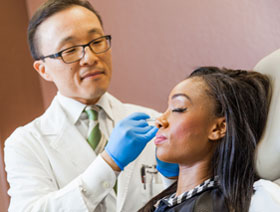 Whether you are on the road regularly for business or are planning that perfect summer vacation, traveling can take a toll on your skin. From low humidity on airplanes to climate changes that trigger outbreaks, it’s important to take into account your skin’s needs as you travel. Here are a few tips from our dermatologists on how to care for your skin while you’re traveling.
Whether you are on the road regularly for business or are planning that perfect summer vacation, traveling can take a toll on your skin. From low humidity on airplanes to climate changes that trigger outbreaks, it’s important to take into account your skin’s needs as you travel. Here are a few tips from our dermatologists on how to care for your skin while you’re traveling.
- Wash your face twice a day. With the busy days and nights associated with travel, it’s tempting to skimp on your skin care routine. At the very least, make sure you wash your face properly in the morning and evening every day in lukewarm (not hot) water. Tip: using make up removal wipes alone isn’t enough.
- Don’t switch products. While it may be tempting to swap out your collection of skin care products in the interest of saving space in your luggage, we don’t recommend it. Your skin is used to your tried-and-true products, and switching to something else can invite trouble. Outbreaks, irritation, allergic reactions and plain old inconvenience are some of the consequences of switching up your skincare routine when you are on the road. If you use medications or over-the-counter treatments for skin conditions such as acne, rosacea or eczema, be sure to bring these along. Either make space for all the little soldiers in your skincare regimen, or transfer them to smaller, travel-sized containers. You might even discover that your favorite cleansers, moisturizers and toners are available in travel sizes. Whatever the case, it’s better to leave that extra sweater behind than to leave your skincare products.
- Hydrate, hydrate, hydrate. One of the biggest stressors to your skin while traveling is the low humidity prevalent in airplanes and hotel rooms. In inhospitable conditions such as these, skin dries out very quickly and can lose its tone and luster. To combat this, drink lots of water (even more than the usual recommended amount). Bring a quality facial moisturizer and use it every day as well as a good night cream. If you suffer from patches of dry skin on a typical day at home, you may want to pack a thick balm to treat those problem areas while you are traveling.
- Don’t forget sun protection. When we go on vacation, we tend to spend more time than normal outside. It goes without saying that if you are planning a trip to the tropics, you’ll need a high quality broad spectrum sunscreen (30 SPF or higher), and you’ll need to reapply often. But even touring city streets on a cloudy day can expose you to dangerous amounts of UV radiation, so apply sunscreen 30 minutes before leaving your rental or hotel room. Ski trips are notorious for producing unexpected sunburns. Reflective snow can increase your sun exposure by 40%, so slather on the sunscreen just as thickly as you would on a Caribbean cruise, being especially careful to protect the area under the chin. For addition protection in sunny climates, consider wearing UPF clothing. More and more companies are designing clothes that are comfortable and attractive while simultaneously providing optimal sun protection for your skin.
- Medical skin conditions can worsen. The last thing you want to happen while you’re on the road is for your skin condition to flare up, but it’s a common occurrence. While high humidity can improve some cases of eczema, the accompanying sweating can actually make it worse. The dry air in colder climates and the heat or air conditioning in hotel rooms can also exacerbate eczema or acne. Be sure to bring your dermatologist-recommended treatments with you when you travel. The only exception would be products that increase sun sensitivity, such as Retin-A for acne. These products can be discontinued for a period of time before travel so that you aren’t putting yourself at greater risk for sunburn (talk to your dermatologist about this). For eczema sufferers, chlorine from swimming pools and water parks can dry out the skin. Rinse off chlorine water after swimming and consider bringing a 1% hydrocortisone cream if you do not use prescription medication. If hotel room air is too dry, you can check with the front desk to see if they have a humidifier.
- Pack smart. Maybe you don’t need a dermatologist to tell you this, but make sure all the caps are tightly secured on all of your skin care products. The pressure changes that occur in airplanes can easily pop open a top that hasn’t been screwed on tightly enough. For practicality’s sake, consider storing all of your skin care products in a separate cosmetic or plastic bag in case something does spill. Better yet, keep your skin care products in your carry-on. This way, if your luggage gets misplaced or lost, you won’t need to replace them.


